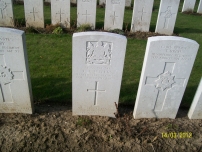| First Name: | John James | Last Name: | JEFFERY | |
|---|---|---|---|---|
| Date of Death: | 14/03/1917 | Lived/Born In: | Blackheath | |
| Rank: | Private | Unit: | Manchester22 | |
| Memorial Site: | 1. Blackheath, All Saints 2. Blackheath, Congrgational Church | |||
Current Information:Age-34 14, Southvale Road, Blackheath Gommecourt British Cemetery2, Hebuterne, France
During February and March, 1917, the Germans made a strategic withdrawal to a new and very strong line running from Arras to Soissons. By doing this they eliminated two large salients and greatly reduced the number of troops needed to man the new defences. As they pulled back to the Hindenburg Line (Siegfriedstellung) they adopted a ‘scorched earth’ policy, systematically destroying everything in their path so as to leave nothing behind that would assist the enemy. Railways and roads were dug up, wells poisoned and even trees chopped down. Mines and booby traps were set to further hinder the British and French troops who followed up behind them until they reached the new formidable defences where one again trench warfare was established. As the Germans fell back they covered their retirement by leaving small infantry detachments in a series of strongly wired posts with many machine guns all of which had to be dealt with by the British troops as they moved forward into vacated territory. One such incident took place on 14th March, 1917 when 7th Division and 46th Division attacked the village of Bucquoy in the northern part of the Somme battlefield. The omens for this attack were not good. There were last minute changes to the timing of the assault but not to the artillery bombardment that accompanied it so the two did not coincide. With zero hour set for 1am on 14th March it was hoped that the full moon would provide some illumination but in the event the sky was overcast and the moon gave no help. Patrols sent out in the afternoon of 13th March had discovered that Bucquoy was still strongly held by the enemy and that their wire was thick and still intact. Rain on 13th March had turned the ground to mud which proved to be a severe impediment on the progress of the assault and because of the alterations in the timing of the attack, which was brought forward from 15th March, much of the equipment needed was not ready. Nevertheless the attack took place. 91 Brigade, 7th Division attacked with 2nd Royal West Surrey (Queens) and 22nd Manchester with 5th South Staffordshire and 5th North Staffordshire being used by 137 Brigade, 46th Division. These battalions only managed to breach the enemy wire in two or three places and those who then gained access to the German trenches soon had to retire when their bombs (grenades) ran out after which there was a general retirement back to their starting positions. Nothing had been gained from this operation, the only results of which were nearly 500 British casualties. One of these was John Jeffery of 22nd Manchester. |
||||
| « Back to Search Results | ||||
| If you think any of the information shown here is incorrect, Click Here to submit your amends and comments | ||||




